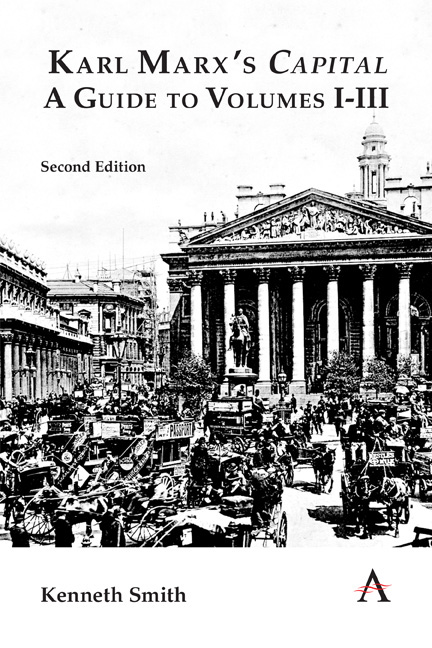Book contents
- Frontmatter
- Dedication
- Contents
- Preface to the Second Edition
- Introduction
- Part I The Development of the Capitalist Mode of Production
- Part II The Capitalist Mode of Production
- Part III The Underdevelopment of the Capitalist Mode of Production
- Part IV The Value Theory of Labour
- Conclusion to Part IV
- Conclusion
- Appendix: On Social Classes
- Notes
- Bibliography
- Index
6 - Extended Reproduction in Capital, Vol. I, Ch. 24
Published online by Cambridge University Press: 17 April 2021
- Frontmatter
- Dedication
- Contents
- Preface to the Second Edition
- Introduction
- Part I The Development of the Capitalist Mode of Production
- Part II The Capitalist Mode of Production
- Part III The Underdevelopment of the Capitalist Mode of Production
- Part IV The Value Theory of Labour
- Conclusion to Part IV
- Conclusion
- Appendix: On Social Classes
- Notes
- Bibliography
- Index
Summary
Marx's discussion of extended reproduction, in Capital, Vol. I, Chapter 24, really only reiterates what he has already said on the subject of simple reproduction in Chapter 23, with however one very important difference. Instead of supposing that capitalists consume unproductively the entire surplus value produced by the process of production in order to reproduce themselves and their families, he now assumes that they reinvest a part of the surplus in order not only to simply reproduce themselves, but to extend the scale of the process of production.
In the main example he gives of this (1974a, 543–9 [1976, 725–33]), Marx supposes that the capitalist has advanced to the process of production a capital, not of £1,000 this time, but £10,000, of which four-fifths (£8,000) is spent on constant capital (means of production, raw materials, etc.), and onefifth (£2,000) is spent on variable capital (wages). Assuming a rate of surplus value (the ratio of variable capital advanced as wages to the total surplus value produced) of 1:1, or 100%, where the variable capital is £2,000, the surplus value produced by this process of production will also be £2,000, since r = s/v. Up to this point, this illustration is the same as the one we looked at in the previous chapter. The only difference is that, in this case, the magnitude of the original capital and the surplus value it produces have been multiplied by 10: instead of a capital of £1,000 producing a surplus value of £200, we now have a capital of £10,000 which produces a surplus value of £2,000. Now, however, instead of allowing the capitalist to consume this surplus value of £2,000 unproductively, Marx assumes that the capitalist not only continues to reproduce his or her original capital of £10,000 at the same rate, but also that he or she capitalizes the additional surplus of £2,000 and uses this to create an additional process of production which may or may not remain united with the original process of production.
- Type
- Chapter
- Information
- Karl Marx's 'Capital': A Guide to Volumes I-III , pp. 50 - 54Publisher: Anthem PressPrint publication year: 2021



